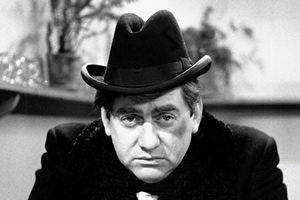
Tony Hancock
- English
- Actor and comedian
Press clippings Page 5
Tony Hancock, profiled
Continuing our 60th anniversary celebrations of Hancock's Half Hour, this week we look at some of those involved in Britain's first sitcom. Regarded by many as perhaps the greatest post war comedian of his generation, here we take a look at the life and career of Tony Hancock.
British Classic Comedy, 4th November 2014Radio Times review
I'm guessing I wasn't the only one who died a little at the thought of this programme. While the discovery of lost episodes is intriguing, the thought of another actor stepping into a hero's shoes usually fills fans with dread -- especially when that hero is the still very much-loved Tony Hancock.
That said, Kevin McNally is quite wonderful here as The Lad himself in this first of five episodes re-recorded to mark the 60th anniversary of Hancock's Half-Hour. Producers Ed Morrish and Neil Pearson have resisted the urge to tinker even slightly with the script and it's testament to the genius of writers Galton and Simpson that the words still sparkle.
Tony Peters, Radio Times, 31st October 2014Battle of the first sitcom
On the 2nd November 1954 on the BBC Home Service Tony Hancock made his debut in a radio show called Hancock's Half Hour, written by Ray Galton and Alan Simpson it became a huge hit with audiences and is widely regarded as Britain's first sitcom. Six years earlier tom other well known writers Frank Muir and Denis Nordan had written a radio comedy series Take It From Here.
British Classic Comedy, 30th October 2014Tony Hancock is still influencing comedy 60 years later
On the 2 November 1954, a 30-year-old comedian named Tony Hancock embarked on his first starring vehicle for BBC radio, Hancock's Half Hour, scripted by two writers aged only in their twenties, Ray Galton and Alan Simpson.
Andrew Roberts, The Independent, 28th October 2014Opinion: why is comedy hooked on misery?
Comedy loves misery. That's the theory. That's why grumpy Tony Hancock was so funny. That's why Les Dawson made a hit out of rarely cracking a smile. And more recently Jack Dee's perma-scowl has been part of the secret of his success.
Bruce Dessau, Beyond The Joke, 27th August 2014Tony Hancock gets blue plaque on 90th birthday
English Heritage have unveiled a blue plaque at a former home of Tony Hancock ahead of his 90th birthday today.
British Comedy Guide, 12th May 2014An idea pioneered by the BBC, lately adopted by Sky, and now back again on the BBC, Comedy Playhouse was an exciting notion: a kind of "try before you buy" test on potential new comedy series. Originally created as a way for Tony Hancock's writers Alan Galton and Ray Simpson to spread their wings beyond East Cheam, the series spawned Last Of The Summer Wine and more Galton & Simpson gold in Steptoe And Son. This doc features the pair as talking heads alongside stalwarts such as June Whitfield.
John Robinson, The Guardian, 29th April 2014Pub favoured by classic comics faces demolition
A London pub that became a 'Mecca for comedy' as a favourite haunt of Tommy Cooper, Tony Hancock and Sid James faces demolition as a hotel group plans to raze a huge part of Leicester Square's conservation area and turn it into a 360-bedroom, 10-story hotel and cinema complex.
Paul Gallagher, The Independent, 27th September 2013Tony Hancock had no children, but for decades his descendants have been all around us. Basil Fawlty, Rigsby from Rising Damp, Brian Potter from Phoenix Nights, Mark Corrigan from Peep Show, Alan Partridge - all inherited his genes, or at any rate his character's genes (it isn't easy to be sure of the difference, given that by far his most successful role was as a miserable actor-comedian called Tony Hancock).
It would be absurd to suggest the listed characters are identical - every one of them is a brilliant creation in his own right - but all are irritable, stuffy, pompous, emotionally constipated and prematurely middle-aged; they tut and sneer and grumble and moan, each convinced that Fate has singled him out for mistreatment he doesn't deserve.
All are in some way thwarted, yearning impotently for stardom (Partridge), status (Fawlty, Potter), a beautiful woman (Rigsby, Corrigan). And each, most importantly, exudes an air of pathos. No matter how wretchedly they behave, the viewer can't hate them. They remain somehow heroes, awful heroes, and against our better judgement we're on their side. Just as we were with their father, Hancock.
On Tuesday the great progenitor was the subject of BBC One's occasional series My Hero. Ben Miller, of Armstrong & Miller, was the man paying tribute, rummaging through his life and shaking his head in admiration at old scripts of Hancock's Half Hour. These scripts were written not by Hancock but by Ray Galton and Alan Simpson, whom Miller interviewed.
Given Hancock enjoyed vast success while Galton & Simpson were writing for him, and next to none after he'd got rid of them, it might be tempting to wonder whether My Hero should have been about them instead. But if Hancock's Half Hour was the biggest thing on radio and TV, it wasn't just because of the dialogue. Hancock himself - and again I'm not sure whether I mean the character, the man or both - stood for something. He stood for England, the England of the 1950s. Weary, glamourless, frustrated, frayed, but battling grumpily on - that was England, and that was Hancock. Hancock's success came to an end not long after the Fifties had. He killed himself in 1968.
Michael Deacon, The Telegraph, 30th August 2013My Hero - Ben Miller on Tony Hancock; TV review
Ben Miller gave us a profile of Tony Hancock with an unexpected depth of insight.
Tom Meltzer, The Guardian, 28th August 2013